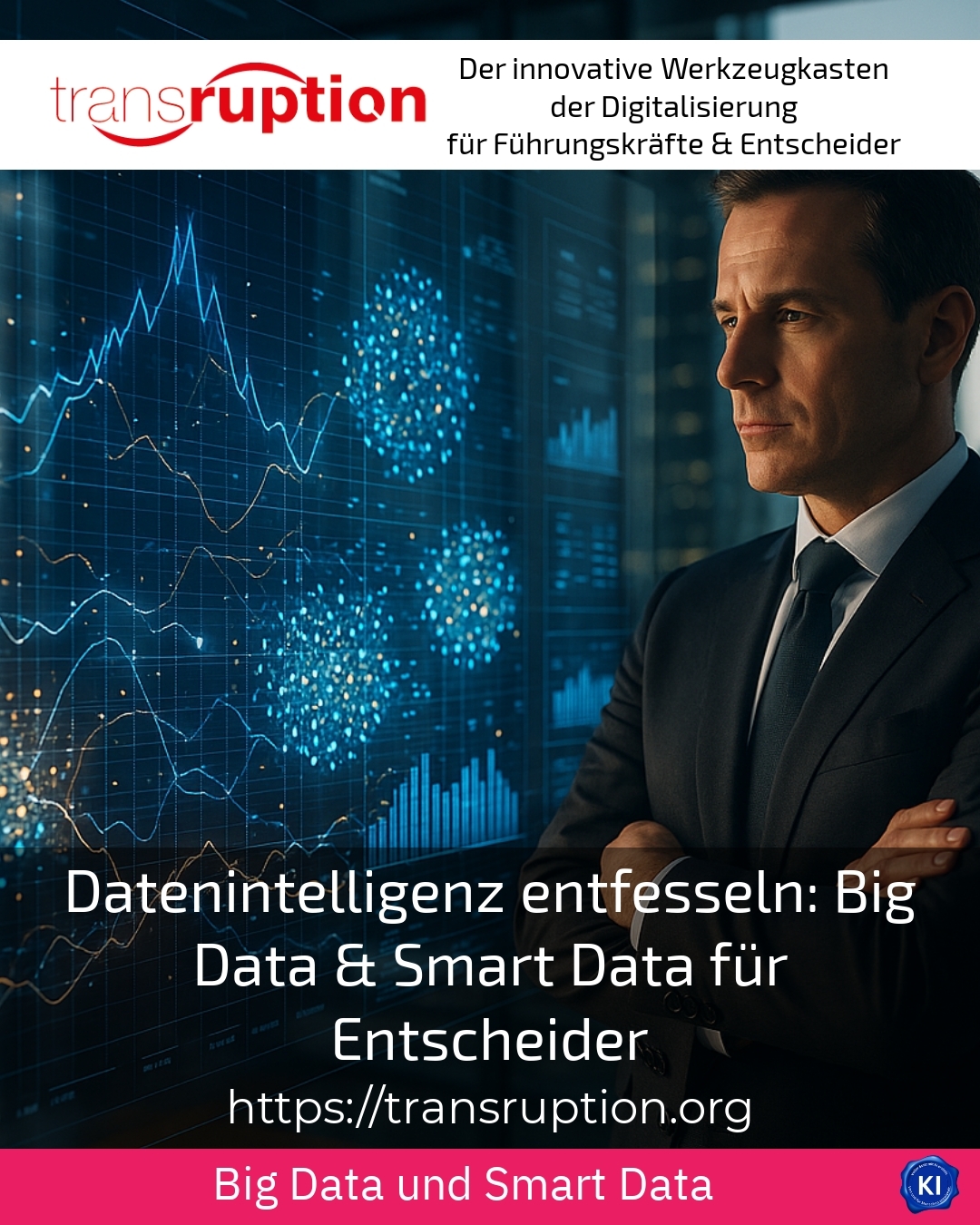In today's digital environment, the ability to gain real insights from volumes of data is becoming increasingly important. This ability is referred to as Data intelligence summarised. It describes the process of generating qualitative and usable smart data from so-called big data. Decision-makers are faced with the challenge of not only collecting this data, but also utilising it in a targeted manner in order to make well-founded and forward-looking decisions.
Data intelligence: from sheer volume to actionable knowledge
Big data refers to the enormous, often heterogeneous and unstructured volumes of data that companies generate on a daily basis. This data comes from a wide variety of sources, for example IoT sensors in industry, customer interactions in retail or transactions in the financial sector. However, the mass of data alone does not bring any benefits. This is where Data intelligence by promoting the processing of this data into high-quality, targeted information.
Smart data is the result of such processing. It involves intelligently filtering, consolidating and analysing big data so that only the data with real added value remains. This not only provides companies with larger amounts of data, but also contextualised insights that enable quick and reliable decisions.
An example from industry: sensor networks record machine status data in real time. Big data here would be the unfiltered flood of all these measured values. Thanks to data intelligence, however, only the most relevant signals for machine maintenance are provided as smart data, which reduces downtimes and increases efficiency.
In retail, on the other hand, millions of customer interactions can be analysed. Data intelligence is used to identify patterns in purchasing behaviour. This allows targeted marketing campaigns to be developed that provide customers with relevant offers and increase conversion rates.
How data intelligence supports decision-makers
Decision-makers need clarity and certainty despite growing volumes of data. Data intelligence provides this through the following aspects:
- Analysis quality: Only relevant data with high data quality is used for decision-making.
- Contextualisation: Smart data are not isolated findings, but embedded in the business or industry context.
- Speed: Real-time analyses enable prompt reactions to market changes.
In the healthcare sector, for example, intelligent data helps to evaluate patient data so that diagnoses can be made more quickly and personalised treatment options can be developed. This leads to better treatment outcomes and more efficient processes.
Data intelligence also supports risk assessment in the financial sector by deriving risks and trends from complex transaction data potential - enabling well-founded lending decisions to be made or fraud attempts to be recognised at an early stage.
Logistics companies also rely on data intelligence to optimise supply chains. Transport-relevant bottlenecks and patterns are extracted from large data streams, allowing routes to be planned efficiently and delays to be minimised.
Technological tools behind data intelligence
Modern technologies are essential to unleash data intelligence. These include, among others:
- Artificial intelligence (AI) and machine learning that recognise patterns in complex data sets and enable forecasts.
- Data Mining, to extract relevant data from large amounts of data.
- Automated data quality assurance, which provides reliable and precise data records.
An example from the automotive industry shows how smart data is combined with AI. Sensors on vehicles generate big data. Machine learning is used to gain precise insights into maintenance requirements. This not only increases customer satisfaction, but also supports the development of new products.
In the energy sector, consumption patterns are analysed using data intelligence. This results in intelligent control systems that make energy use more efficient and help to save costs.
BEST PRACTICE at the customer (name hidden due to NDA contract)
BEST PRACTICE at the customer (name hidden due to NDA contract) A leading retail company used data intelligence to generate targeted product suggestions from billions of pieces of customer data. This made it possible to improve the personalisation of the offer, which led to measurably higher sales and greater customer satisfaction.
Best practices and tips for getting started
A successful introduction to data intelligence can be achieved with the following steps:
- Prioritisation of relevant data sources to sharpen the focus.
- Establishment of an interdisciplinary team of IT, data scientists and specialist departments.
- Creating transparency in data origins and quality.
- Investment in suitable technologies and continuous training.
An example from the retail sector shows that the integration of customer data from online and store sales enables significantly better staff planning. This enables peak times to be managed more efficiently and resources to be conserved.
In production, data intelligence supports predictive maintenance. This minimises unplanned downtimes through early intervention.
My analysis
The ability to Data intelligence is a decisive success factor for companies today. It is no longer the sheer volume of data that is decisive, but the intelligent utilisation of this data. Companies that transform big data into smart data create transparency, efficiency and innovative strength. The combination of technological tools, qualified personnel and clear processes is becoming increasingly important. The continuous further development of data analysis helps decision-makers to act in a more informed and targeted manner and thus secure competitive advantages.
Further links from the text above:
Smart data - definition and benefits
Big data vs. smart data: the focus on quality
Data intelligence: From a mountain of data to value
Data intelligence for decision-makers in the company
Smart data: How intelligent data is shaping our future
For more information and if you have any questions, please contact Contact us or read more blog posts on the topic TRANSRUPTION here.















